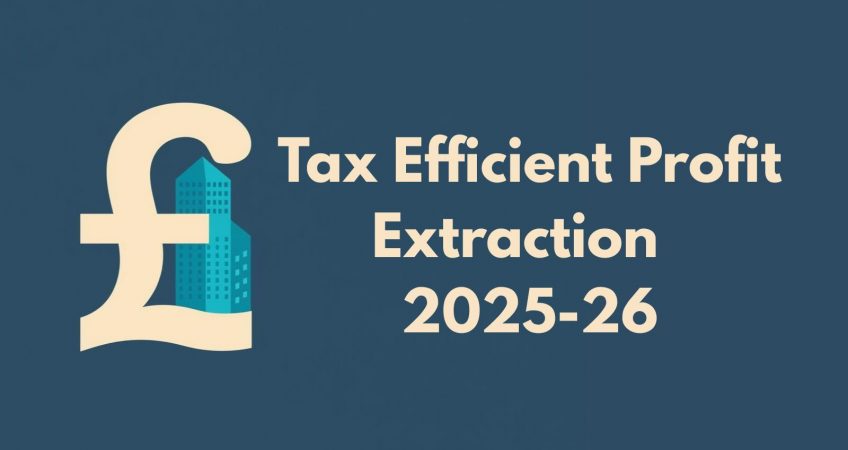
Tax Efficient Company Profit Extraction – 2025/26
Owners and directors commonly ask: “What’s the best way to extract profits from my limited company?”
There isn’t a single answer – the right approach depends on your company’s profits, your personal tax position and whether you want to preserve company cash for growth. We find that the best answer is often a carefully planned combination of the following:
Salaries
The simplest route is to pay yourself a salary through PAYE. A frequently used level is £9,100 per year, which avoids personal tax and employee National Insurance. You can combine this with dividends (see below) to form a balanced remuneration package.
A salary between the Lower Earnings Limit (£6,500) and the Primary Threshold (£12,570) counts as a qualifying year toward your State Pension. If you have more staff on the payroll, you may reduce employer NIC costs by using the Employment Allowance, currently £10,500 per year (though it’s not available if you are the sole employee-director).
Dividends
Dividends are paid from post-tax profit reserves and must be formally declared. The tax free dividend allowance is £500. Despite recent changes to the allowances and tax rates, dividends are still an attractive part of directors’ remunerations packages as they are taxed at lower rates than salaries and are free from National Insurance Contributions.
Alphabet shares can also be used to extract profits from the company, but it is a complex area and specialist tax advice should be taken when using these.
Director’s Loan Accounts
Directors can borrow up to £10,000 for up to 21 months tax-free by borrowing the money on the first day of the accounting period and repaying the loan nine months after the year end.
If the loan is tax free and exceeds £10,000 it will trigger a benefit in kind charge. Failure to repay the loan within 9 months of year end will create a section 455 tax charge (temporary tax which is repaid once the loan has been settled).
Use director’s loans primarily for short-term cashflow support — but always keep accurate records and aim to repay quickly. Take care to ensure that taking the loan does not jeopardise the cashflow of the business.
Pension Contributions
The company can contribute to a registered pension scheme on your behalf. The payments are tax deductible – so they reduce your corporation tax. This can be one of the most tax-efficient ways to extract profits for longer-term planning. The only drawback, like most pension contributions – the funds are locked until you reach pension access age (limits apply).
Mobile Phones
A company may provide a mobile phone (including a smartphone) to a director or employee without triggering a benefit-in-kind, even with private use. However, this rule does not cover devices like tablets or laptops.
Cars
Company cars incur a benefit-in-kind charge based on CO₂ emissions. If the company pays for private fuel, there is an additional fuel benefit charge. Low-emission vehicles are more tax-efficient. Otherwise, you may prefer reimbursing business mileage instead. See our blog on the most tax efficient way to purchase a car via your limited company here.
Mileage
Reimbursing business mileage for personal vehicles is tax-free when properly recorded. Current rates are 45p per mile for the first 10,000 business miles in a tax year, then 25p per mile thereafter – so keep an accurate log of journeys. Unfortunately the rates were set fourteen years ago and have not been changed since!
Medical Check-Ups & Insurance
A company can provide tax free annual medical check-up to an employee/director provided it is available to all employees.
Private health insurance can also be provided. A benefit in kind charge will arise but this is still cheaper than paying for the insurance yourself.
Meals
Meals provided on the employer’s premises are tax-free provided all employees are entitled to them. Make sure you file the receipts to support your claim in case of an inquiry.
Trivial Benefits
These provide an opportunity to extract small amounts of profits from the company without paying tax and national insurance. A benefit is “trivial” if it costs the company £50 or less and isn’t actual cash. Examples are gift cards (non-cash redeemable), small gifts like wine, chocolate, flowers, taking staff out for a modest meal. For directors, the cap is £300 per annum.
Final tips:
- Document everything: payroll records, dividend vouchers, directors’ loan entries, board minutes, mileage logs, etc.,
- Plan: base your strategy on your personal circumstances.
- Get advice from a Chartered Accountant: Contact us to learn more or discuss ways we can help you plan your profit extraction methods.
